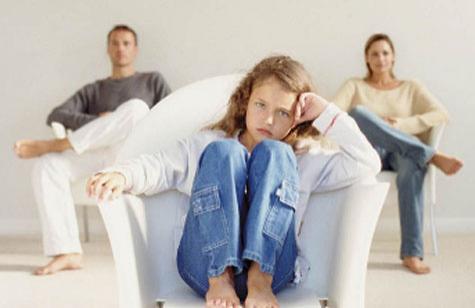Over the phone, Mike told me that theirs was "a pretty amicable divorce." That changed, however, once he started dating Maggie, who spends most weekends at Mike's house.
Recently, Adam has refused to spend time at his father's house, and clams up whenever they are together. Mike told me his son was becoming surly, "which is just not like him and never has been."
Mike is far from alone. Every year, millions of children under age 18 must deal with the emotional and logistical issues that stem from their parents' decision to divorce. Rebelliousness, social isolation or a sudden change in friends, attitude problems and dropping grades all can crop up in the wake of divorce.
When separated or divorced parents argue, or criticise each other to their children, the kids are left feelling vulnerable and confused. Seeing how their parents are mishandling their own emotions, children don't have a safe place to express their own fear, guilt or anger. Parents must have the maturity and courage to set aside their own grief and be positive, supportive role models for their children. If they can manage that, they likely will find that their children will be resilient.
Rachel joined Mike and me for a few sessions to talk about helping Adam adjust to their new lives.
I reminded them that their divorce came just when Adam was already dealing with the physical and emotional turmoil that all adolescents grapple with. As he was starting to separate from his parents, trying to form his own identity and deal with new social pressures, what he thought was a stable family unit fell apart.
Pulling away from Dad was Adam's attempt to show loyalty to his Mum while also expressing anger at his father for including someone new in their already jumbled lives.
Here are some suggestions I offered Adam's parents to reduce conflict and confusion during this major life event:
1. Normalise, normalise, normalise. Change, even for the better, is stressful. Children thrive in environments that are safe and predictable. If curfew has always been 10 pm, continue that no matter which house they are sleeping in.
Some parents try to compensate for the negative effects they think the divorce has had on children by saying "yes" as often as possible. That's a mistake. Stay as consistent as possible in your parenting style. Effective parenting requires love and fair, consistent discipline, not friendship or inappropriate permissiveness.
2. Be open and honest. Divorce means loss to children, and they will have questions. Answer as honestly as you can without burdening them with too many unnecessary details. Kids deserve to have a basic understanding of why their parents split up. Parents need to come together and agree on what they will say. Statements like "Ask your dad why he left" or "I have no idea why your mum wanted a divorce" create confusion and place the child between warring factions.
3. Reassure them, over and over, that the divorce was not their fault. Make sure they know that you genuinely care about what they are going through, not just your own misery. Children internalise conflict and pain. Resist the urge to bash or criticise the other parent. Remember that your ex-spouse is still your child's parent. Negative messages will only instill shame and confusion in a child.
Mike and Rachel were able to resolve some of their misunderstandings while sorting through new expectations since the divorce. They agreed on ways to co-parent Adam while maintaining separate households. Later, Adam was encouraged to ask questions in family sessions to gain a better perspective on what he could expect.
Mike saw that he needed to compromise, too.
A few weeks ago, Mike called to say that Adam had resumed their weekend visits.
"Now I see my girlfriend during the week so when Adam comes over, the three of us are not always together," he said. " Adam and I have some alone time, too."



















__small.png)










